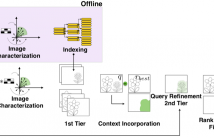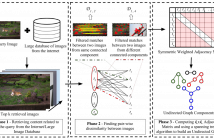
The International Conference on Image Processing (ICIP), sponsored by the IEEE Signal Processing Society, is the premier forum for the presentation of technological advances and research results in the fields of theoretical, experimental, and applied image and video processing. ICIP has been held annually since 1994, brings together leading engineers and scientists in image and video processing from around the world. Visit website.

- Read more about PROVENANCE FILTERING FOR MULTIMEDIA PHYLOGENY
- Log in to post comments
Departing from traditional digital forensics modeling, which seeks to analyze single objects in isolation, multimedia phylogeny analyzes the evolutionary processes that influence digital objects and collections over time. One of its integral pieces is provenance filtering, which consists of searching a potentially large pool of objects for the most related ones with respect to a given query, in terms of possible ancestors (donors or contributors) and descendants.
- Categories:
 17 Views
17 Views- Read more about 4K-UHD Real-time HEVC Encoder with GPU Accelerated Motion Estimation
- Log in to post comments
- Categories:
 32 Views
32 Views
- Read more about U-Phylogeny: Undirected Provenance Graph Construction in the Wild
- Log in to post comments
Deriving relationships between images and tracing back their history of modifications are at the core of Multimedia Phylogeny solutions, which aim to combat misinformation through doctored visual media. Nonetheless, most recent image phylogeny solutions cannot properly address cases of forged composite images with multiple donors, an area known as multiple parenting phylogeny (MPP). This paper presents a preliminary undirected graph construction solution for MPP, without any strict assumptions.
- Categories:
 9 Views
9 Views- Read more about FEATURE SAMPLING STRATEGIES FOR ACTION RECOGNITION
- Log in to post comments
- Categories:
 2 Views
2 Views- Read more about LOOSECUT: INTERACTIVE IMAGE SEGMENTATION WITH LOOSELY BOUNDED BOXES
- Log in to post comments
- Categories:
 15 Views
15 Views- Read more about Hierarchical Bilinear Network for High Performance Face Detection
- Log in to post comments
HBN_lv.pdf
- Categories:
 9 Views
9 Views- Read more about Learning Optimal Parameters for Binary Sensing Image Reconstruction Algorithms
- Log in to post comments
A novel data-driven reconstruction algorithm for quantum image sensors (QIS) is proposed. Observations are efficiently decoded by modeling the reconstruction structure as a two-layer neural network, where optimal coefficients are obtained via error backpropagation. Our model encapsulates the structure of state-of-the-art algorithms, yet it presents a faster alternative which adapts to input examples without a priori statistical information.
- Categories:
 39 Views
39 Views- Read more about FSVO: SEMI-DIRECT MONOCULAR VISUAL ODOMETRY USING FIXED MAPS
- Log in to post comments
We propose a fixed-map semi-direct visual odometry (FSVO) algorithm for Micro Aerial Vehicles (MAVs). The proposed approach does not need computationally expensive feature extraction and matching techniques for motion estimation at each frame. Instead, we extract and match ORiented Brief (ORB) features between keyframes and assist-frames. We replace the incremental map generation step in traditional algorithms with fixed map generation at keyframe and assist- frame only in our algorithm, resulting in reduced storage memory and higher flexibility for relocalization.
- Categories:
 12 Views
12 Views- Read more about FSVO: SEMI-DIRECT MONOCULAR VISUAL ODOMETRY USING FIXED MAPS
- Log in to post comments
We propose a fixed-map semi-direct visual odometry (FSVO) algorithm for Micro Aerial Vehicles (MAVs). The proposed approach does not need computationally expensive feature extraction and matching techniques for motion estimation at each frame. Instead, we extract and match ORiented Brief (ORB) features between keyframes and assist-frames. We replace the incremental map generation step in traditional algorithms with fixed map generation at keyframe and assist- frame only in our algorithm, resulting in reduced storage memory and higher flexibility for relocalization.
- Categories:
 7 Views
7 Views- Read more about CSfM: Community-based Structure-from-Motion
- Log in to post comments
Structure-from-Motion approaches could be broadly divided into two classes: incremental and global. While incremental manner is robust to outliers, it suffers from error accumulation and heavy computation load. The global manner has the advantage of simultaneously estimating all camera poses, but it is usually sensitive to epipolar geometry outliers. In this paper, we propose an adaptive community-based SfM (CSfM) method which takes both robustness and efficiency into consideration. First, the epipolar geometry graph is partitioned into separate communities.
- Categories:
 11 Views
11 Views